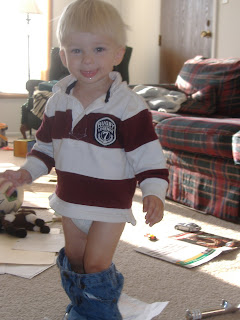In April my mom bought Henry a pair of jeans (size 12 months). They didn't quite fit back then:
I tried them on him again today. He didn't seem to fare much better. They kept sliding right off him. He didn't let it keep him down though:
Wednesday, September 26, 2007
My skinny baby
Posted by Kim at 8:57 PM 5 comments
Saturday, September 22, 2007
Some days I still feel like this girl
 I read a short story in high school that described the development of self as a layering process. If we could dissect our personalities they would be like the layers of an onion or the rings of a tree. According to the story, each year we add another layer to ourselves, a distinct, identifiable part that contributes to our personality and behaviour. As this layering process continues, the traits we acquired earlier become less prominent, but they are always there, lying beneath the surface, waiting to emerge. So when I calmly respond to Henry eating deodorant by flushing his mouth with water while dialing Poison Control, that's the part of me that's 27. When I overact to a completely benign comment Bubba made by running to my room and slamming the door, that's the part of me that's 11. When I am inordinately happy because I just spotted a blue jay, that's the part of me that's 3.
I read a short story in high school that described the development of self as a layering process. If we could dissect our personalities they would be like the layers of an onion or the rings of a tree. According to the story, each year we add another layer to ourselves, a distinct, identifiable part that contributes to our personality and behaviour. As this layering process continues, the traits we acquired earlier become less prominent, but they are always there, lying beneath the surface, waiting to emerge. So when I calmly respond to Henry eating deodorant by flushing his mouth with water while dialing Poison Control, that's the part of me that's 27. When I overact to a completely benign comment Bubba made by running to my room and slamming the door, that's the part of me that's 11. When I am inordinately happy because I just spotted a blue jay, that's the part of me that's 3.
I'm afraid the patchwork quilt model would tempt us to remove other personality traits, too, the little quirks and peculiarities that make us wonderfully identifiable as "us". I'm glad that I know the part of Bubba that lost his wallet days before our wedding. I love the part of Traci that could be convinced that wearing a belt over her nightgown made it adequate attire for a night out with her friends. I wouldn't want to forget the part of Scott that couldn't quite get the timing right when laying out the plot of a scary story. Sometimes, we are perfect in our imperfections.
If we could get rid of all our undesirable traits, who's to say that our current layer is our best? Perhaps the layering model will have to suffice for now, allowing us to both repress the worst and recall the best that is in us.
Even on my best days, I couldn't reclaim the innonence or sweetness I possessed at 9. But at least I've ditched those glasses.
Posted by Kim at 9:01 AM 6 comments
Tuesday, September 18, 2007
Henry's New Do
We cut Henry's hair on Saturday. I held him down and Bubba did his best with the scissors. Unfortunately, his best wasn't great. Henry went from looking like Shaggy on Scobby Doo to Dennis the Menace.
Before:
After:
Posted by Kim at 5:25 AM 4 comments
Thursday, September 13, 2007
To read or not to read
Bertrand Russell said, "There are two motives for reading a book: one, that you enjoy it; the other, that you can boast about it." Despite my literary standards, I have found that bragging rights alone aren't enough to read a book . I tried reading Joyce's Ulysses last summer, and while I would love to be able to brag that I have completed the novel, I couldn't stomach my way through it. Dare I say that some so-called classics are downright miserable to read?
Should we read for edification or amusement? I recently read about an evangelical campaign in the early 1800s that implored readers to "Put down that novel!" The organization feared that reading solely for entertainment would lead to the "grossest darkness and spiritual ignorance." There is something to be said for substance, with or without style. But we want to be entertained, too.
While I was visiting my family this summer, my mom kept persuading me to read some book about vampires. I resisted. She persisted. I would wake up to find the book on my bed stand. She would slip it next to me while I was talking to my sister. Despite her best efforts, I rejected her recommendation in reading material. My mom came to visit me last week. We went to the Magnificent Mile in Chicago, and stopped in at Borders. And there was another one of these vampire books, the store's number one best-seller.
Should I succumb and read Stephanie Meyer's novels? Are they brag-worthy? Even if not, are they entertaining enough to make it worth my while?
Posted by Kim at 1:13 PM 11 comments
Tuesday, September 4, 2007
This will literally take only 2 seconds to read
To introduce the Primary lesson I taught on Sunday, I wrote on the board 'What is the most incredible thing you've ever heard?' The lesson was on the Resurrection, and I thought this question would be a nice way to introduce this truly incredible and important gospel principle. I made it clear to the class that whatever their responses to this question were, they had to be true. What I failed to consider was that my class consisted of four ten-year old boys. It turns out, these boys have heard lots of incredible things, although the veracity of these incredible facts is somewhat questionable. Their examples became increasingly more unbelievable, and the discussion completely devolved when one boy recounted a story that included a freak accident involving a highlighter-sniffing classmate, a semi-truck, and a bicycle. I won't awe you with the details.
When children tell outrageous tales, we call it 'telling stories.' When adults tell such tales, we call it lying. Still, our childhood fascination with telling stories never really escapes us. We know that when we tell a story, it should have a point, but it's even better if it's interesting, too. And so, when we tell our own stories, our own personal narratives, the impulse to exaggerate, to embellish, to enhance is always present.
A good example of this is found when people recount events that took a specific amount of time. We often hear things like, 'It literally took me all day to finish that paper!' Or, 'I literally spent 8 hours in line at the DMV.' When you say such things, it's almost as if your subconscious knows you're about to lie, and sends a message to your brain, saying, 'Throw out literally! Then we'll really fool them!'
Of course, we omit information as often as we exaggerate it to make our personal narratives more interesting: I took 1st in my division (out of ...1), I only got 'A's in college (I only enrolled in and completed 1 course... bowling), I scored just below the 95th percentile (okay, I scored in the 75th percentile).
I could go on, but I have a really important meeting with the Prime Minister of Malaysia in literally 2 seconds.
Posted by Kim at 5:44 PM 3 comments
















